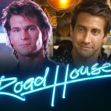Paramount Pictures has won a recent copyright lawsuit initiated by the heirs of the author of a 1983 magazine story that served as inspiration for the original Top Gun film.
The plaintiffs, Shosh and Yuval Yonay, filed the lawsuit against Paramount, alleging that the studio proceeded with the development of a major sequel without renegotiating a new license.
U.S. District Judge Percy Anderson's decision to dismiss the case was primarily based on the presence of factual similarities between the original article and the sequel that are not protected by copyright law. The court stated that while both works involve Top Gun along with its “graduates and instructors,” it emphasized that Top Gun is a legitimate US Navy fighter pilot school and the individuals featured in the article are “real people” and not fictional characters. The case hinged on the contention that certain aspects of the film were substantially different from Ehud Yonay’s 1983 article, rendering any concurrent factual similarities unprotected by copyright law.
Judge Anderson's ruling relied on the application of the extrinsic test, a legal method employed by courts to evaluate copyright infringement allegations. This test involves comparing the external elements of two works to assess objective similarities, rather than subjective interpretations or individual expressions. Its purpose is to ascertain whether the works under scrutiny possess significant enough similarities to establish a case of copyright infringement.
Paramount's defense argued that the studio was not obligated to obtain a new license, since the article in question was a work of nonfiction that bore no resemblance to the sequel. Additionally, Paramount maintained that the sequel had been completed prior to the termination date cited by the Yonays.
The dismissal of the case also extended to the breach of contract claim filed by the Yonays against Paramount. Judge Anderson determined that Paramount was not obligated to credit Yonay in the film, as the sequel had been produced “independently of any rights” conveyed to the studio by contract.






